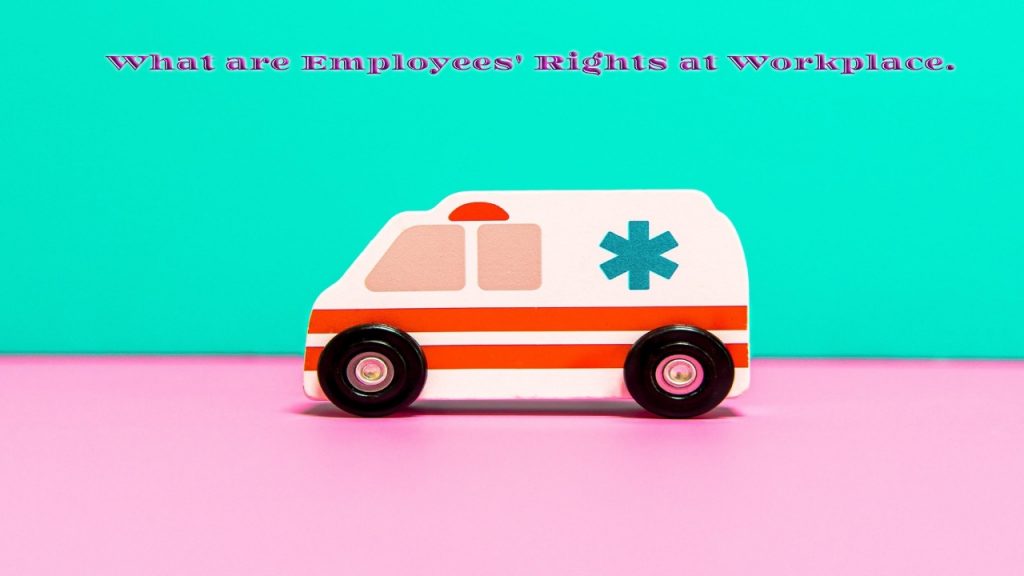If you’re an Employer or a business owner, you have a responsibility to provide your workers with a safe environment and protect employee rights. This duty is enshrined in federal law as stipulated by the Occupational Safety and Health Act of 1970. In addition, almost every U.S. state requires business owners to purchase workers’ compensation insurance to cover the costs of workplace injuries. Fail to do so may result in a hefty fine or even jail time.

The Right to A Safe Workplace
All employees have the right to a safe workplace. To ensure employers provide this, the Department of Labor, through OSHA, created thorough safety requirements for businesses. For example, employers must:
- Maintain Your a workplace free of serious recognized hazards.
- Provide your employee rights with safe and well-maintained equipment and tools for work.
- Provide safety training for all your employees in a language they understand.
- Display the poster bearing the rights and duties of your employees as stipulated by the OSHA in an easily visible location.
- Follow all mandated reporting guidelines for injuries and fatalities.
- Keep records of all such incidents.
- Provide past and present employees and their representatives with access to your records of work-related illnesses and injuries.
The Right Workers’ Compensation Benefits
Although the legal logistics vary by state, most companies operating within the U.S. have to provide workers’ compensation insurance to their employees. You also have to inform your employees of their workers’ comp. And benefits and provide them with all the information and paperwork necessary for them to file a claim should a work-related incident occur.
After filing a workers’ compensation claim, the injured employee may receive several benefits from the insurer, according to the terms of your policy. Compensation benefits can include:
- Medical treatment for the injury incurred while working; this can include emergency room visits, surgeries and other procedures, and prescriptions
- The cost of ongoing care
- A portion of their lost wages if they are temporarily unable to work
- Funeral expenses in the case of a fatality
The Right to Reject a Workers’ Compensation Package
If the affected employee in an incident is not satisfied with the compensation package the insurer offers them. They are well within their rights to reject it. Should an employee take this route, both you and the employee can exercise your right to legal representation.
At this point, the employee can opt to pursue either a lump-sum settlement or a structured workers’ comp settlement. While the settlement process varies from state to state, most follow this basic structure:
- The employee and their legal representative determine what they believe is a fair payout for any of the following costs: disability payments, lost wages, future lost wages, hospital bills, ambulance rides, surgeries, pain and suffering, future medical payments, and attorney fees.
- Next, the employee and their lawyer contact the insurance provider and try to negotiate a settlement.
- If the parties involved do not reach an agreement. The employee can pursue a workers’ comp hearing in which a judge determines the fair settlement amount.
Throughout the settlement and hearing process, you, as the employer, should do whatever you can to keep things moving. This includes providing the employee any and all paperwork they may need. While negotiations may feel stressful, this is the exact reason you need workers’ compensation coverage in the first place. Having an insurance policy creates a framework for compensation and establishes a negotiation process should an employee reject the package offered.
Invest in Safety and Peace of Mind
Investing in creating a safe working environment for your workers will ideally reduce risks of injuries and make your employees feel safe and cared for. If you promote workplace safety and purchase a high-quality workers’ comp policy from a reputable provider, your employees will thank you through company loyalty. Employees who know their employers have their back will stick around for the long haul, even if a workplace injury occurs.
Plus, settling and following safety procedures will save you money in the long run. You stand to face fewer claims from your employee rights; if you have a short claim history, your future workers’ comp premiums will be lower.


